 |
BIOGRAPHY
Alessandro
Pertini was born in Stella, in the province of Savona
(Liguria) on September 25, 1896, to a prosperous family (his
father, Alberto, was a landowner).
He had four siblings: Luigi, the eldest, became a painter;
Marion married an Italian diplomat; Giuseppe became an
officer in the armed forces; while Eugenio died tragically
at a very young age in a concentration camp in Flossenburg
on April 25, 1945.
|
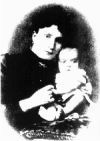 |
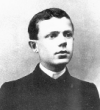 |
Devoted
to his mother, Maria Muzio, Pertini studied at the
"Don Bosco" Salesian college of Varazze and then
(in high school) at the Liceo "Chiabrera" in
Savona. His philosophy professor there was Adelchi
Baratono, a reforming socialist who contributed to Filippo
Turati's review-Critica Sociale-and who undoubtedly
contributed to bringing Pertini closer to socialist
thought and to the circles of the workers' movement in
Liguria.
|
Pertini
enrolled at the University of Genova from which he
graduated with a degree in jurisprudence.
In 1917, the young Pertini was drafted as a second
lieutenant and sent to the front along the Isonzo River
and near Bainsizza. Although the military authorities had
been notified of his socialist and neutralist tendencies,
they still recognized a series of acts of valor by the
young Lieutenant Pertini who was nominated for a silver
medal for military valor for leading an assault on Mount
Jelenik in August 1917. In 1918 Sandro Pertini began his
political activism in the Italian Socialist Party (PSI). |
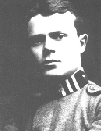 |
|
After
the war, Pertini moved to Florence where he stayed with
his brother Luigi. He enrolled at the Istituto Cesare
Alfieri and received a degree in political science in
1924, submitting a thesis entitled "La
Cooperazione" ("Cooperation").
In Florence he came into contact with those socialists and
democrats who had advocated entering the Great War
following Gaetano Salvemini, the Rosselli brothers, and
Ernesto Rossi. At this time he joined Italia Libera, a
movement opposing fascism. Finding himself immediately in
conflict with the fascist movement which had come to power
in October 1922 with the March on Rome, Pertini, then a
young lawyer, soon became the target of repeated attacks
from fascist mobs.
In 1924, after the barbarous assassination of Giacomo
Matteotti by fascists, Pertini joined the PSU (Unitary
Socialist Party). |
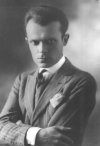 |
Following
the assassination of Matteotti, Pertini launched himself
into intense antifascist activity. Several times the
office of his law firm in Savona was wrecked and he was
physically attacked on repeated occasions by
squadristi-fascist thugs. On May 22,1925, Pertini was
arrested in Stella for distributing a clandestine
publication entitled Under the Barbarous Fascist
Domination. The articles published in this pamphlet, whose
authorship Pertini claimed, stressed the responsibility of
the Crown for the preservation of the fascist regime and
for its illegal, violent activities. |
|
In
addition, this pamphlet expressed distrust (in the
impartiality) of the Senate of the Realm, then controlled
by a majority of fascist sympathizers, which had been
called upon to judge in its High Court of Justice the
alleged complicity of General Emilio De Bono in the
Matteotti assassination.
Charged with "instigating hatred among social classes"
(a crime under Art. 120 of the Zanardelli criminal code),
in addition to publishing clandestinely, to insulting the
Senate, and to impairing the Crown's prerogative to
renounce responsibility for the acts of the government,
Pertini, during his pre-trial questioning as well as
before the court's Prosecutor and during his public trial
before the Tribunal of Savona, insisted that he had worked
alone and that he accepted full responsibility for his
actions. He added that regardless of his sentence he would
continue his antifascist struggle for socialism and
freedom.
On June 3 of that same year, he was sentenced to eight
months in jail and fined for the crimes of clandestine
publication, insult to the Senate, and impairing the
Crown's prerogatives. He was, however, acquitted of the
charge of instigating class hatred. Released after the
successful appeal of his lawyer, G.B. Pera, Pertini took
up the struggle where he had left off at the time of his
arrest.
On June 9,1925, on the eve of the anniversary of the
Matteotti assassination, Pertini, aided by some workers,
managed to hang, under the marble slab placed on the wall
of the fortress of Savona commemorating Giuseppe Mazzini's
imprisonment, a crown with a red banner inscribed with
"Glory to Giacomo Matteotti."
The fascist attacks and the violence which he suffered
gradually increased in intensity. The worst of these,
during the summer of 1926, led to his hospitalization. In
November 1926, after Zamboni's failed attempt on
Mussolini's life, Pertini, like many other antifascists
throughout Italy, was subjected to renewed fascist attacks.
Forced to abandon Savona, Pertini fled to Milan. On
December 4, 1926, following the proclamation of new laws
against antifascists, Pertini was placed under confino-a
court-appointed relocation under strict police
surveillance-for five years (the most the law allowed). |
In
flight from the authorities, hiding out in Carlo Rosselli's
Milan apartment, Pertini was able to meet, in person, the
"master" of reformist socialism, Filippo
Turati.
Pertini was one of the orchestrators of Turati's
sensational clandestine expatriation.
|
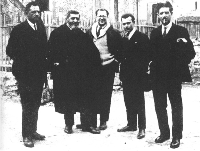
|
|
The
departure of the leader of the Italian reformist socialist
movement had been decided in order to keep Turati out of
the hands of the fascists At the last minute, in part
because he had been subjected to confino, Pertini was
chosen to accompany Turati in his flight into exile. The
first leg was to Savona.
From December 8 to the 11, Pertini and Turati were
harbored in the house of Italo Oxilia in Quigliano. On the
night between December 11 and 12, accompanied by Ferruccio
Parri, Carlo Rosselli, and Adriano Olivetti, in addition
to Boyanc�, Oxilia, Da Bove and Amelio the mechanic,
Turati and Pertini boarded a motorboat steered by Oxilia
and Da Bove from a pier in Savona.
After a storm-filled trip, they reached the city of Calvi
in Corsica, on the morning of the 12th. While the others
turned back for Italy on the afternoon of the following
day, Pertini and Turati remained in France as they had
planned. In a highly emotional passage, Pertini would
later recall the bitterness of Turati's departure, fully
aware that he would never again return to Italy, his
homeland.
On the morning of December 14, Parri and Rosselli were
identified as they moored their motorboat in Marina di
Carrara. They were immediately connected to Turati's
sensational flight.
The affair was brought to a close at the famous trial of
Savona which concluded on September 14, 1927 with
sentences of 10 months of jail for Ferruccio Parri, Carlo
Rosselli, Da Bove and Boyanc�, as well as for Turati and
Pertini, in absentia. Oxilia, as leader of the expedition,
received a heavy sentence as well.
The trial of Savona was one of the last collective
protests against fascism.
|
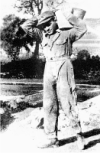 |
While in exile, Pertini formed ties to other Italian
antifascists abroad. He took part in the Congress of the
League for Human Rights held in Marseilles. He moved to
Paris and then to Nice, working at different jobs in order
to survive: taxi washer, manual laborer, brick-layer,
peintre en b�timent (painter of buildings), movie
extra.
In 1928, with money he received from the sale of a
farmhouse inherited in Liguria, Pertini, under the false
name of Jean Gauvin, established a radio transmitter in
Eze, near Nice, from which to broadcast antifascist
propaganda. |
|
He was found out, tried and sentenced to a month in prison
(suspended) and fined by the Tribunal of Nice. Pertini
could hardly tolerate his life of exile from the moment he
arrived on French soil His character required that he
return to Italy as soon as possible, and he started to
plan his return to his homeland in the beginning of 1929.
On March 26, 1929, using a false passport for a Swiss
citizen named Luigi Roncaglia, Pertini was finally able to
return to Italy. There, he got in touch with the
clandestine antifascist network. He was identified and
arrested in Pisa on April 14, 1929. Brought before the
Special Tribunal, Pertini was sentenced on November 30,
1929, to ten years and 9 months of prison and to 3 years
under special vigilance.
During the entire proceedings, Pertini maintained what the
Prefect called "a haughty and contemptuous demeanor,"
refusing to recognize the authority of the very Tribunal.
At his sentencing, Pertini replied by crying out "Hurray
for socialism" and "Down with fascism."
This behavior resulted in Pertini's imprisonment in Regina
Coeli (in Rome) and in the prison of Santo Stefano. In
spite of much harassment, Pertini always maintained an
attitude of serenity and firmness.
Soon his name was mentioned in the same breath as those of
the other antifascist leaders. He managed to make contact,
albeit sporadic and fortuitous, with other antifascists.
Not long afterward, however, his health began to suffer. A
campaign to sway public opinion was launched; it brought
minimal results. Thus, in December 1930, Pertini, now ill,
was relieved from his harsh conditions of imprisonment and
was transferred to a clinic for the chronically ill in
Turi. There, Pertini met and befriended another imprisoned
antifascist leader, Antonio Gramsci.
In April 1932, Pertini was transferred to a sanatorium
prison on the island of Pianosa. In spite of these
improvements, he did not get better so that his mother
felt she had to plead for mercy. For the first time the
relationship between mother and son suffered. Pertini
rejected the plea for mercy directing very harsh words to
both his mother and the president of the Special Tribunal.
In September 1935, Pertini was released from prison and
taken to confino on the island of Ponza.
In 1939, he was transferred first to the Tremiti Islands
and then to Ventotene. He regained his freedom, more than
14 years later, only in August of 1943, a month after the
fall of fascism. After July 25, a free man at last,
Pertini became one of the major protagonists of the
movement for national liberation. Among those who took
part, in Rome, in the reconstitution of the socialist
party, he was put in charge of its military organization.
After September 8 and the flight of the royal family from
Rome, Pertini fought alongside military and civilians in
defense of the capital at Porta San Paolo. He went
underground following the Nazi occupation of part of the
peninsula and he was active until October 18, 1943, when
he was arrested along with Giuseppe Saragat, by Nazis or
Fascists. Imprisoned in Regina Coeli, he was interrogated
harshly and sentenced to death without his having betrayed
his fellow partisans.
On January 24, 1944 he was liberated thanks to partisan
action. Having regained his freedom of movement, Pertini
joined the central military leadership of the National
Liberation Committee as a representative of the PSIUP (Italian
socialist party, proletarian union). After moving north,
Pertini reorganized the Socialist Party in Northern Italy,
soon becoming its secretary, and he took part in the
activities of the CLNAI (National Italian Liberation
Committee).
In July 1944, after the Allies liberated the capital, he
returned to Rome crossing the battle line. He then took
part in the battle for the liberation of Florence.
|
|

|
In
October 1944 he returned north once again. Having reached
France by plane, he crossed Mont Blanc and re-entered
Italy where resumed his role of leader of the PSIUP and
the CLNAI.
In April 1945 he was among the organizers of the
insurrection of Milan, along with Leo Valiani and Luigi
Longo. During these months he met a partisan messenger,
Carla Voltolina, who would later become his wife.
|
|
Secretary
of the PSI in 1945, elected to the Constituent Assembly,
later a member of parliament, director of (the Socialist
Party newspaper) Avanti! in 1945-1946 and in 1950-1951,
Pertini was one of most prominent figures of the socialist
party of the early post-war years.
Although he was in favor of a political alliance with the
PCI (the Italian Communist Party), Pertini always defended
the autonomy of the socialist tradition-understood as the
exaltation of democracy and freedom, of the defense of the
interests of the most disadvantaged social classes and of
the working class in particular.
From his point of view, the role of the Socialist Party
was to be that of a "democratic conscience among the
working masses." A proponent of peace and of d�tente
between East and West, during the Cold War he shared the
prevalent view on the left in Italy according to which the
U.S.S.R., having defeated nazism and fascism, was a
crucial player in maintaining the political balance that
followed the Second World War.
This position, however, was more the result of seeking a
dialogue between East and West than one adopted from a
prior allegiance to the Soviet orbit. Moreover, following
the events of 1956, while not abandoning all faith in the
experience which emerged from the October Revolution
(1917), Pertini reaffirmed the requirements of democratic
rule of law, of a nation's right to self-determination and
of national sovereignty-principles manifestly violated by
the Soviet armored tanks.
Belonging to this same line of thought are the constant
condemnation of colonialism of all kinds, whether explicit
as that of France in Indochina or covert as that of Italy's
"trusteeship" in Somalia (whose colonization
started in 1889 with this pretence). Within the party,
Pertini always kept himself above the factional conflicts
and always appealed to party unity.
Pertini welcomed the formation of center-left governments
as the harbinger of a significant political participation
of the working class (although the majority of workers
were still excluded as they voted for the communist
opposition). Pertini looked favorably upon the Atlantic
alliance, for its defensive and stabilizing role, and
especially upon a united Europe, conceived as a union of
ordinary Europeans and not just of a united diplomatic
representation for free-flowing capital.
In 1968, he was elected President of the House of
Representatives (Parliament). Pertini filled this office
with considerable even-handedness and a great respect for
the institution. He inaugurated his practice of regularly
meeting young people from all over Italy. |
|
On
July 8, 1978, after protracted voting for the needed
two-thirds majority, Sandro Pertini was elected the
seventh President of the Republic.
These were the anni di piombo ("years of lead"),
the years of terrorism, of economic crisis, and of the
political-parliamentarian crisis following the failure of
the government of national solidarity which followed the
kidnapping and the assassination of Aldo Moro.
|
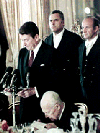
|
|
Quite
apart from the institutional and political role Pertini
played-it was he who, during his mandate as President,
nominated the first lay prime minister, Giovanni Spadolini,
and then the first socialist, Bettino Craxi-his character
and humanity emerged unquestionably.
Despite his old age, Sandro Pertini succeeded in
rekindling in Italians their faith in their institutions.
Despite his old age, he traveled throughout Italy and
abroad where he represented the Italian State at various
functions, both happy and tragic. His intransigent
denunciations carried the great authority of his office
and (during his visits to the sites of terrorist attacks)
his visibly distressed figure echoed the alienation felt
by both public opinion and by Italian workers in
particular before the work of terrorists-a foreign body
undermining the society of Italians.
Pertini adopted much the same attitude toward organized
crime when he denounced the Mafia for its "harmful
activity against humanity." During the years of his
presidency, Pertini turned more insistently to defending
human and political rights at an international level, for
instance denouncing South Africa's apartheid, South
American dictatorships, and the Soviet Union's invasion of
Afghanistan.
A great communicator, Pertini displayed an extraordinarily
forthright manner, even at unavoidably official and
stilted functions and, all the while, his measured but
heartfelt expression invested his words a universally
appropriate message. No Italian head of state or
politician has enjoyed popularity comparable to his, under
the most varied circumstances.
He received honorary degrees from the most prestigious
universities, he was nominated an honorary French academic,
and his opinion was constantly sought by the foreign
media. Pertini greatly helped Italy's image abroad.
When his term as president was up, he became a senator for
life. The only official role he chose to accept, upon the
invitation of some academics and historians of the
workers' and socialists' movements, was that of President
of the "Filippo Turati" Foundation for
Historical Studies of Florence inaugurated in Florence in
1985 with the end of preserving the rich documentary
patrimony of Italian socialism.
Pertini died in Rome on February 24, 1990.
|
|
Home |
|
The Association | Publications |
Archives | The
Library |
| The Exhibition Centre | Virtual
Museum |
|
 |
![]()

